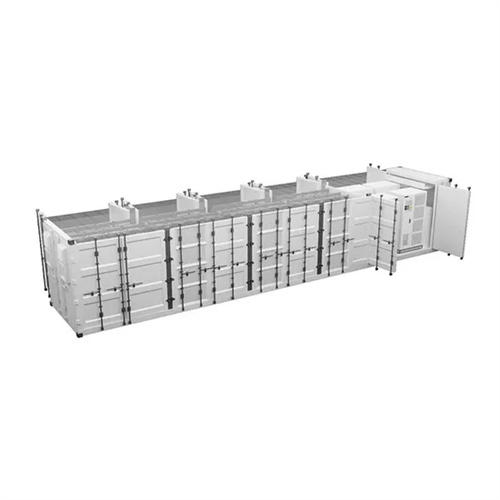Property Building Energy Storage System

Building energy flexibility with battery energy
The battery energy storage system (BESS) is making substantial contributions in BEF. This review study presents a comprehensive analysis on the BEF with BESS, in terms of the current study statues

Battery Energy Storage Systems
Johnson County defines Battery Energy Storage System, Tier 1 as "one or more devices, assembled together, capable of storing energy in order to supply electrical energy at a future time, not to include a stand-alone 12-volt car

Going vertical with building-based solutions for battery energy storage
The surge in battery energy storage systems (BESS) correlates with the need to stabilize the variability of solar and wind on the grid and provide for the retirement of baseload

Phase change material-based thermal energy
Phase change material (PCM)-based thermal energy storage significantly affects emerging applications, with recent advancements in enhancing heat capacity and cooling power. This perspective by Yang et al. discusses PCM thermal energy

Sustainability Series: Energy Storage Systems Using
Location — Dedicated energy storage enclosures and buildings physically separating the hazard from other assets offer the best protection against fire or explosion damage to critical operations.When space separation is not

Building Energy Storage
Building Energy Storage Introduction. As the electric grid evolves from a one-way fossil fuel-based structure to a more complex multi-directional system encompassing numerous distributed energy generation sources – including

Building energy flexibility with battery energy storage system: a
Building energy flexibility (BEF) is getting increasing attention as a key factor for building energy saving target besides building energy intensity and energy efficiency. BEF is

A methodical approach for the design of thermal
Recent research focuses on optimal design of thermal energy storage (TES) systems for various plants and processes, using advanced optimization techniques. There is a wide range of TES technologies for

What does an ideal Battery Energy Storage Site (BESS)
A key technology in managing this gap between generation and demand are Battery Energy Storage Sites (BESS). These can charge from the grid when there''s an abundance of renewable electricity during peak

6 FAQs about [Property Building Energy Storage System]
What is battery energy storage sites (Bess)?
One of the largest challenges with renewable energy generation is that it’s intermittent and does not always generate electricity in line with periods of high demand. A key technology in managing this gap between generation and demand are Battery Energy Storage Sites (BESS).
How do battery energy storage sites work?
A key technology in managing this gap between generation and demand are Battery Energy Storage Sites (BESS). These can charge from the grid when there’s an abundance of renewable electricity during peak generation periods and then discharge back onto the grid when there’s a shortfall in supply.
Why are battery energy storage systems important?
Battery energy storage systems (BESSs) use batteries, for example lithium-ion batteries, to store electricity at times when supply is higher than demand. They can then later release electricity when it is needed. BESSs are therefore important for “the replacement of fossil fuels with renewable energy”.
What are battery storage plants?
In short, battery storage plants, or battery energy storage systems (BESS), are a way to stockpile energy from renewable sources and release it when needed. When the wind blows and the sun shines turbines and solar panels may generate more energy than needed on a particular day.
What is thermal energy storage?
Author to whom correspondence should be addressed. Thermal energy storage (TES) is a technology that stocks thermal energy by heating or cooling a storage medium so that the stored energy can be used at a later time for heating and cooling applications and power generation. TES systems are used particularly in buildings and in industrial processes.
What are electrical energy and chemical storage systems?
The recently developing electrical energy and chemical storage are Battery Energy Storage Systems and Hydrogen Energy Systems, through it is urgently necessary to overcome the difficulties of high cost, relatively low efficiency and demanding storage environment and so on.
Related Contents
- Building energy storage system projects
- Government Building Photovoltaic Energy Storage
- Building an energy storage system with integrity and cooperation
- Energy storage building Estonia
- Classification of photovoltaic energy storage
- New Energy Storage Battery Exhibition
- Energy storage power supply aging cabinet
- Wind power battery energy storage system
- Glink New Energy Storage Battery
- Zinc-iron flow battery energy storage system
- Price trend of photovoltaic energy storage batteries
- Transformer automatic energy storage system